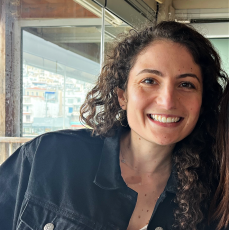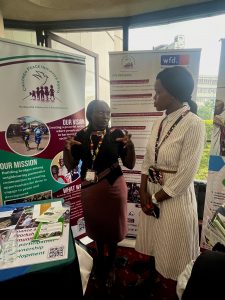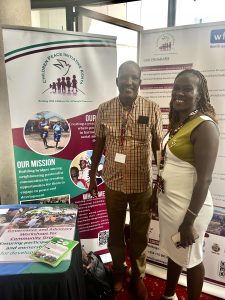Before starting my fellowship at CPIK, I had the opportunity to research conflict among pastoralist groups in central and East Africa. For example, I compiled a case study on farmer-herder conflict in the Middle Belt of Nigeria. I also spoke to my professors about how climate change relates to the uptick in violence over the past few decades among pastoralist groups in northern Kenya, including those whom CPIK works directly with, like the Pokot. As academics should, I came away with more questions than answers—and I bring them into my fellowship.
I am curious about the international community’s narrative that climate change is the driving cause of conflict, particularly over the last decade. In fact, billions of dollars in externally-designed “climate resilience” interventions have not seemed to meet the needs of these tribes, evidenced by a humanitarian crisis in the midst of a four year drought. Indeed, former peace fellow Julia Holladay noted the alternative, research-driven narrative—that climate change exacerbates conflict but does not directly cause it. To elaborate, environmental fluctuations have been a reality that pastoralists have dealt with, and adapted to, for millennia. While the planet is currently heating up at an unprecedented rate, which contributes to irregular rainfall and increased temperatures, pastoralist groups have historically managed despite various periods of floods and droughts through using indigenous knowledge.
Furthermore, inter-tribal violence is not inevitable. This University of Sussex study examined the historic “moral economy” of pastoralists in Kenya’s Isiolo County. It found that over the past 45 years, tribes relied on “redistribution, comradeship, diversification, and collective response to protect the livelihoods from external threats.” Referencing the two tribes we will work with this summer—the Pokot and Il Chamus—I am curious whether they historically maintained a social environment that managed conflict and exercised interdependence.
So, perhaps one of the main questions for me to explore this summer is, IF the Pokots and Il Chamus have experienced peace in the past despite environmental fluctuations, then what has changed? What are the additional complicating factors besides climate change that has caused violence? What are we missing here, and what should be part of future interventions?
To address these questions, I am excited to be working with CPI, which has worked for 13 years to prioritize localized interventions and does so by developing authentic relationships with children, warriors, and elders. The “fora outreach” camps this summer will quite literally meet the tribes where they are (in the fora) to discuss pastoralists’ personal experiences with the eroding grazable land and drying watering holes. And these testimonies will inform CPI’s interventions. I’m looking forward to exploring this “bottom-up” approach to mitigating pastoralist conflict. As I enter the next three weeks of fieldwork, I ask the following questions: (1) How can we at CPI balance our targeted work on climate change, while recognizing the multi-faceted nature of this conflict—which involves the influx of small and light arms weapons, ineffective policing, and/ or corrupt governance? (2) What are ways that CPIK programming can empower warriors, who may feel that their source of prestige and income (acquiring cows) is being threatened? (3) Within the tribes themselves, are there men who are not fighting? Why? What are their relationships with those who are? And critically, how are women and children valued?
I have more questions, but there are eight more blogs for that, and I presume I’ll be using at least some of that airtime with answers. In the meantime, I’d like to give kudos to the CPI team for participating in the GIZ Conference for Peace this week in Nairobi. CPI showcased our work amongst a large group of other local peacebuilding NGO’s in a jam-packed but exciting two day event.
Posted By Olivia Landau
Posted Jun 5th, 2024




5 Comments
Delaney Rogers
June 5, 2024
Olivia, I truly enjoyed reading your post about the questions CPI has inspired thus far. I imagine many more will arise and be answered throughout your time in Kenya. Although they are large questions, I hope this summer can answer them. I think you have touched on the problems facing climate policy at large—what are we missing, and what needs to be included in the future? I can’t wait to read further about your summer and your answers to these questions!
Mary Ellen Cain
June 10, 2024
Such thought-provoking questions and helpful background information about the farmer-herder conflicts and the influences of climate change! I look forward to reading more of your posts as you learn more about these complex issues.
Iain Guest
June 15, 2024
Great blog, Olivia! You and I have had some lively conversations about these issues already and I’d like to think that might have helped to further spark your curiosity! You certainly pose all the right questions in this blog. Just to be clear, though, we have never suggested that climate is the only, or even the main, driver of conflict. Nor can we expect to establish any sort of cause and effect in the foreseeable future. The fact remains, though, that climate is on everyone’s mind and when you see cattle that have died from drought – as previous Fellows have done – that may explain why. Also, Kenya is a laboratory for international efforts to challenge climate change – and everyone is looking for answers. With their experience of working with pastoralists, CPIK is perfectly placed to help! In terms of solutions, our sense is that CPIK is settling itself a very modest objective, namely helping pastoralists to build climate resilience, This language is understood by all and is pretty much the same as sustainable development. In other words, it is broad enough to open the way to interventions that may have very little to do with climate or conflict directly, but could help mitigate practices that are manifestly damaging to the environment such as the size of pastoralist herds. One other thing jumps out of your blog for me and that is your observation that the Pokot and Ilchamus have enjoyed relative peace, even though they face all same challenges as others from drought etc. I really hope to learn why in your future blogs! Sorry for the long comment, but you certainly have our attention!
Bobbi Fitzsimmons
June 16, 2024
It sounds as though you are off to a great start to your work. I eagerly look forward to the answers to some of these far-reaching questions. There surely are no simple solutions.
Julia Holladay
June 17, 2024
Keep up the curiosity, Olivia! It will be very enlightening to hear from local communities what their thoughts are to your questions and where CPI Kenya takes their work based on the response. The nexus of climate adaptation and conflict is truly fascinating space with a lot of room for exploration. I personally find the gender dynamics you raise in your last question is particularly interesting—something I would challenge to keep in mind across conversations as continue your time in Kenya (I’ll do anything to give a plug for gender mainstreaming haha). Big kudos and great work to the CPI Kenya team for the conference!